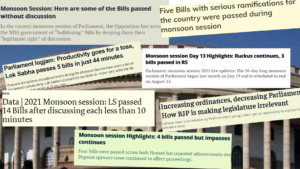 In a democracy, debates and discussions are essential. Issues of governance are of vital importance. Parliament is meant to keep a check on the government by the people and for the people. But in 2020, the budget session was held for only 23 days, and the monsoon session for just 10 days, while the winter session was cancelled!
In a democracy, debates and discussions are essential. Issues of governance are of vital importance. Parliament is meant to keep a check on the government by the people and for the people. But in 2020, the budget session was held for only 23 days, and the monsoon session for just 10 days, while the winter session was cancelled!
All this was done in the name of Covid-19. But in January, they claimed that they have conquered coronavirus. In similarly affected countries like Brazil, Italy, France etc, Parliaments had continued to function.
But here, there was a proposal to cancel the question hour and zero hour. In 1962, during the war with China and during the 1975 Emergency, ‘question hour’ alone was cancelled. Finally, zero hour was allowed for 30 minutes, but question hour was cancelled. Pegasus issue and the Farm bills were not allowed to be discussed. The IBC bill was passed in 5 minutes, Tribunals reform Bill in 9 minutes, Taxation amendment bill in just 6 minutes! 13 bills were not referred to any Parliament Committee, says PRS. When the Labour Code was referred to the standing committee, 233 amendments were proposed and 172 accepted. Accountability through Parliament is gone; transparency is gone; governance is gone. The courts have to intervene when constitution of India is affected,” lamented Justice Madan Lokar in the Janata Parliament on functioning of the Parliament held recently.
Let’s have a glimpse of a few acts passed surreptitiously.
The General Insurance Business Act 2021 paves way for the government to privatise all four general insurance companies- National Insurance, Oriental Insurance, United India and New India created in 1972 to provide general insurance cover which was not provided by the private insurance companies. The government anticipates that higher private participation will raise the level of insurance penetration and social protection; secure insurance of policyholders better and contribute to faster growth of economy. There are already 23 private general insurance companies including Reliance operating in the country. Their performance is dismal. Now the government wants to hand over the companies doing well and providing better services, having better claim ratio and 153 competitive policies to the private players because the private sector is not able to compete with the public sector. One example is the government’s own ‘Crop Insurance’ policy. The public sector companies have paid more than the policy premium to the customers, but many private insurers do not touch this policy. Those who have crop Insurance have a dismal performance. For years, the claims are not paid. If privatisation happens, you will not get your car accident claims, crop failure claims, fire accident claims etc. They will say it’s an act of God and not covered in the policy.
A widow who lost her husband in a car accident has not yet received the claim from Axa Insurance and now after 8 year the case is taken to the Supreme Court by Axa. Even then, they didn’t honour the Court’s verdict.
Look at the taxation law amendment. The government has decided to withdraw its own tax laws, which allow taxing NRIs and foreign companies to pay tax on the profit earned in India. It’s going to refund Rs.8089 crores collected by the Tax department with great difficulty. The biggest beneficiary is Cairn Energy now owned by Vedanta’s Anil Agarwal. (Rs.7880 Cr to be refunded). The Govt squeezes all of us through GST and other taxes on oil, gas, eatables etc but gives relief to the neo-rich! The PM says, “Govt has will to deliver on its promises.” Not the promises made to the people, but the promises made to his corporate cronies.
The Factoring Amendment Act paves the way for Non Banking Financial Companies to squeeze MSMEs with high interest and no accountability by allowing easy entry into factoring for the NBFCs and also removing compulsory registration of factored bills with in 30 days. MSMEs are the losers.
The Insolvency and Bankruptcy Code Amendment Act provides for pre-packaged insolvency arrangement which will help defaulters to get hair cuts (write off) and banks will write off more loans without accountability.
The Essential Defence Services Act has provided powers to the Govt to ban strikes in ordinance factories which are under corporatisation and later will be in the process of privatisation. This will take away the rights provided under the Industrial Disputes Act, Trade Union Act and the constitution itself. The constitution under freedom of speech provides the right to protest.
This strike ban will be implemented in other industries too if not protested against and withdrawn.
The Tribunals Reform Act 2021 takes away the rights of the tribunals and the tribunals will become subsidiaries of the government. They will lose whatever independence they have. This is challenged in the court.
All these 19 Acts, passed in this session, except a few, need to be repealed. The Congress and opposition parties should give an oath that they will be repealed, and they also have to be tested in the Supreme Court.
Thomas Franco is the former General Secretary of All India Bank Officers’ Confederation.
Centre for Financial Accountability is now on Telegram. Click here to join our Telegram channel and stay tuned to the latest updates and insights on the economy and finance.
